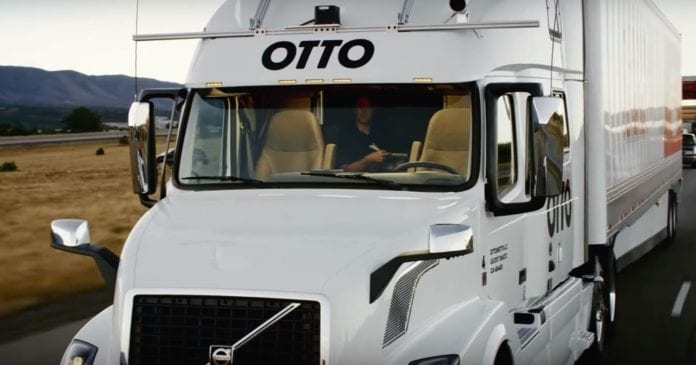Last week, 51,777 cans of beer were shipped on what will go down as the first commercial shipment by an autonomous vehicle. Otto, Uber’s recently purchased self-driving trucking company, partnered with Anheuser-Busch to carry the shipment of Budweiser through Colorado without anyone behind the wheel. While most conversations about beer and self-driving pivot around reducing the risks of drunk driving, this demonstration showed how autonomous vehicles could potentially alleviate the demanding schedules of truck drivers, and find a way around government regulations.
https://www.youtube.com/watch?v=Qb0Kzb3haK8
Otto uses a system of cameras, radar and laser-based lidar sensors to control the truck’s acceleration, braking and steering. The semi-tractor started in Fort Collins, traveling 120 miles south through the state’s capital to get to Colorado Springs.
“Our professional driver was out of the driver’s seat for the entire 120-mile journey down I-25, monitoring the self-driving system from the sleeper berth in the back,” Otto said in a statement.
The above video of the drive shows the image of a 53-foot trailer filled with 2,000 cases of Bud driving down I-25 with a human looking at an empty driver’s seat

Otto’s solutions are currently confined to highways, with humans taking over in city traffic. Otto and Anheuser-Busch plan to undertake additional real-world autonomous truck drives in the months ahead.
“The initial appeal for us was to see how we could meet the needs of a company like Anheuser-Busch,” Otto co-founder Lior Ron told USA Today. “But now after this successful test, we’re eager to see how it will handle other roads and other weather.”
In Colorado, the Department of Transportation worked with Otto to evaluate the company’s technology and join in on test runs before agreeing to let an Otto go forward with its project.
“Safety remained our primary concern, but we believe that in this case the driver is the automated system itself,” said Amy Ford, spokeswoman for the Colorado DOT. “We’d like to help get this tech deployed in the real world.”
But there are concerns that trucks without human hands at the wheel eventually could mean fewer jobs for the 1.7 million truckers currently working in the United States.

